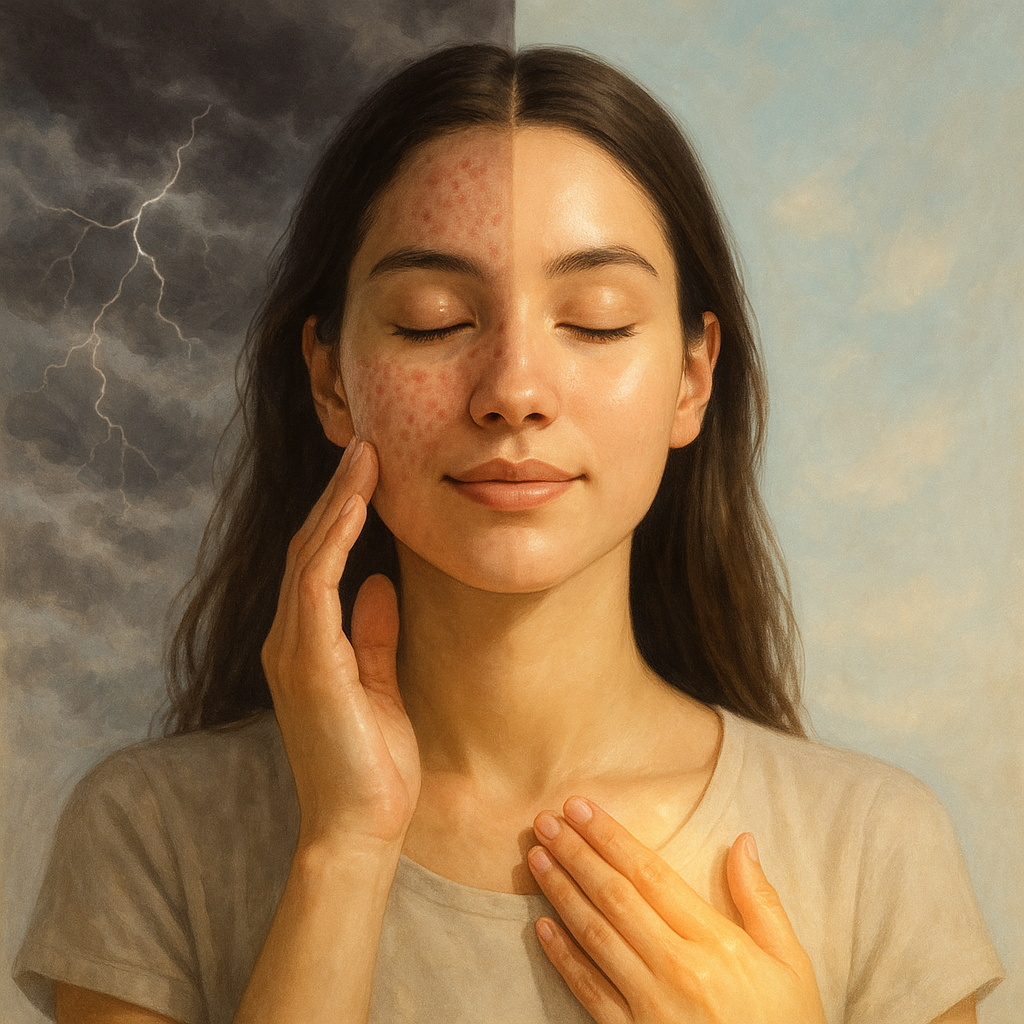We all know that stress can wreak havoc on our mental health, but did you know it can also directly affect your skin? The connection between stress, mental health, and skin conditions is far deeper than most people realize. As the body’s largest organ, your skin reflects what’s happening inside — including emotional stress, anxiety, and hormonal imbalances.
In this blog, we’ll explore how stress and mental well-being impact skin health, the science behind it, and what you can do to care for both your mind and skin.
The Skin-Mind Connection: How Stress Affects the Skin
The skin and brain are connected through the nervous and immune systems. When you’re under stress, your body produces hormones such as cortisol and adrenaline. These are helpful in short bursts, but chronic stress keeps these hormones elevated — and your skin pays the price.
Cortisol and Inflammation
Cortisol increases inflammation, which can worsen conditions like eczema, psoriasis, and rosacea. It also accelerates the breakdown of collagen and elastin, leading to early signs of aging.
Stress and Acne
You may notice that you break out more during periods of stress. That’s because cortisol increases oil production in your skin, clogging pores and triggering acne flare-ups. Stress can also worsen existing acne, creating a cycle that’s hard to break.
Damaged Skin Barrier
Chronic stress compromises the skin’s natural barrier, making it harder to retain moisture and protect against environmental damage. This can result in dryness, irritation, and increased sensitivity to skincare products.
Slower Healing
Whether it’s a small cut or acne scar, high stress levels slow down the skin’s ability to repair itself, leaving it more vulnerable to infections or long-term damage.
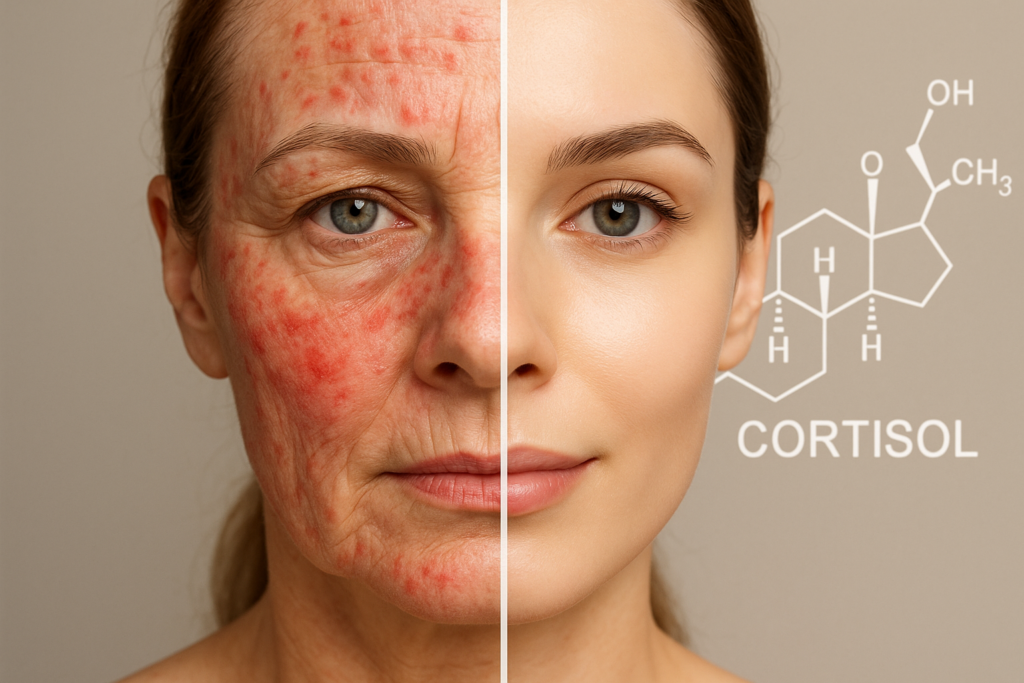
Mental Health and Skin Conditions: The Emotional Impact
Beyond stress alone, certain mental health conditions also play a major role in how your skin behaves. This mind-skin loop is the basis of a growing field called psychodermatology — which studies how mental states affect skin health.
People with anxiety or OCD may develop compulsive habits such as skin picking or hair pulling (known as dermatillomania and trichotillomania), which damage the skin and can cause scarring. Depression may result in neglect of skincare, worsening conditions like acne, seborrheic dermatitis, or dryness. Meanwhile, those who suffer from visible conditions like psoriasis or eczema may experience social anxiety, low self-esteem, and even isolation.
This emotional distress often leads to further inflammation, making the skin worse — and trapping people in a vicious cycle.
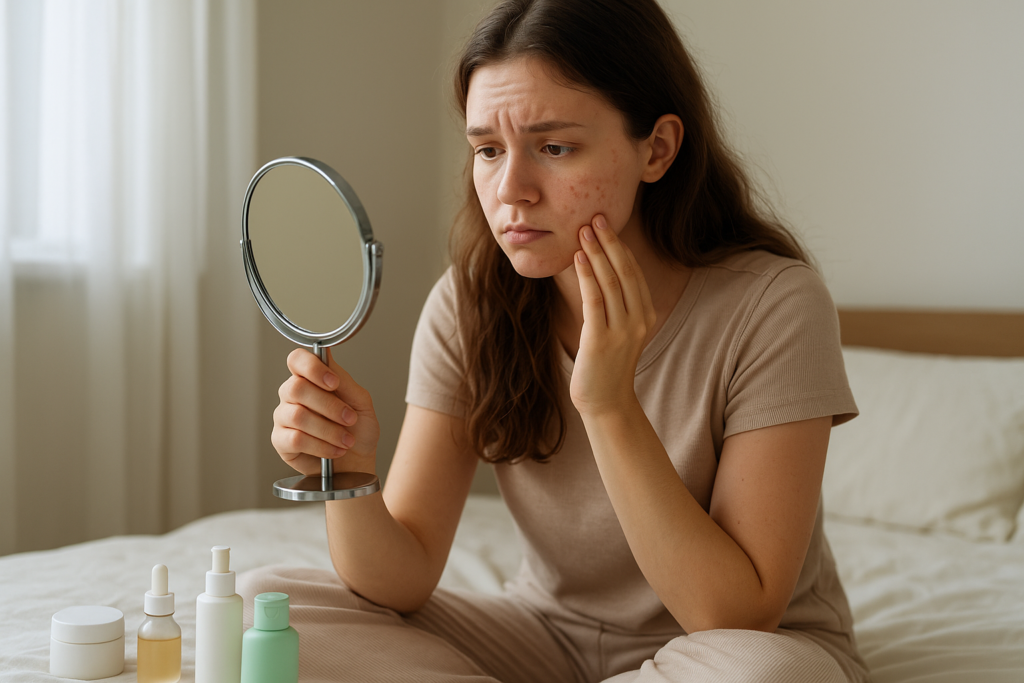
Stress-Related Skin Conditions: What to Look Out For
Some skin conditions are particularly sensitive to emotional triggers:
- Psoriasis: While it’s largely genetic, stress is a common trigger for flare-ups, making symptoms more frequent and severe.
- Eczema (Atopic Dermatitis): Stress weakens the skin barrier, resulting in red, itchy, inflamed skin. The more you stress, the worse it gets.
- Rosacea: Emotional stress, anxiety, and embarrassment are known triggers for this condition, often causing visible redness and sensitivity.
- Alopecia Areata: Stress can lead to sudden hair loss due to immune system imbalance — often triggered by emotional or psychological strain.
Understanding these connections helps you recognize when emotional wellness might be influencing physical symptoms.
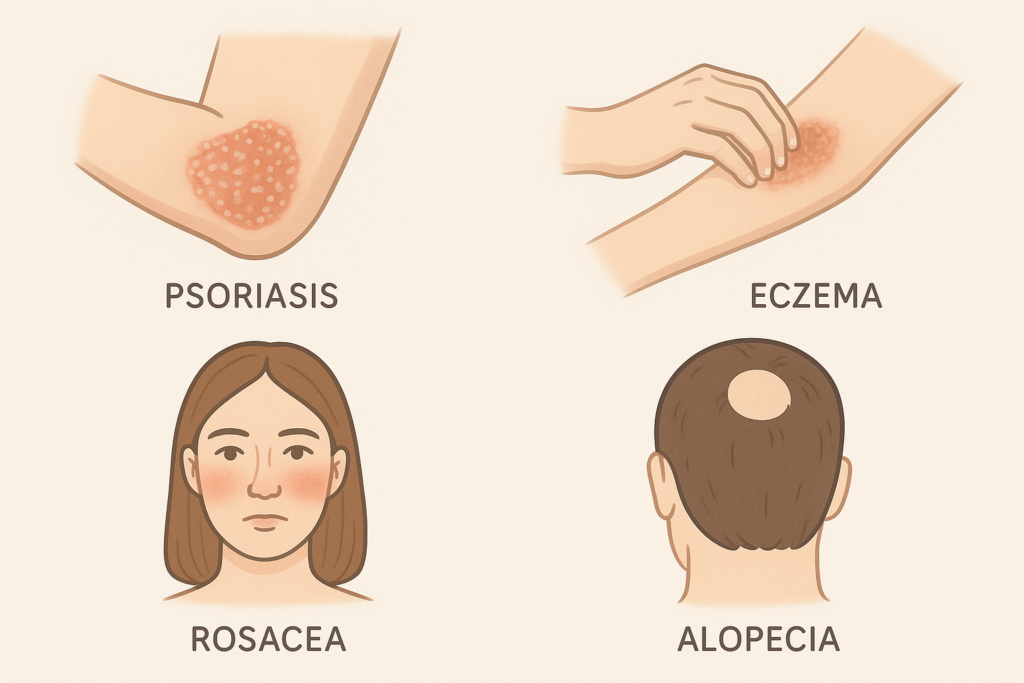
Managing Stress to Improve Skin Health
With over 34 years in clinical practice, I’ve seen many patients improve or even reverse chronic skin conditions by simply learning how to manage their stress levels.
Reducing stress doesn’t have to be complicated. Daily mindfulness practices like yoga, meditation, and breathing exercises regulate hormones and reduce inflammation. Even walking outdoors can lower cortisol levels and boost overall mood.
At the same time, maintaining a gentle and consistent skincare routine — even during stressful times — helps protect your skin. Look for hydrating, non-irritating products that support the skin barrier. For example, De Jour Repair Cream is formulated to restore moisture and calm sensitivity, especially when your skin is under stress.
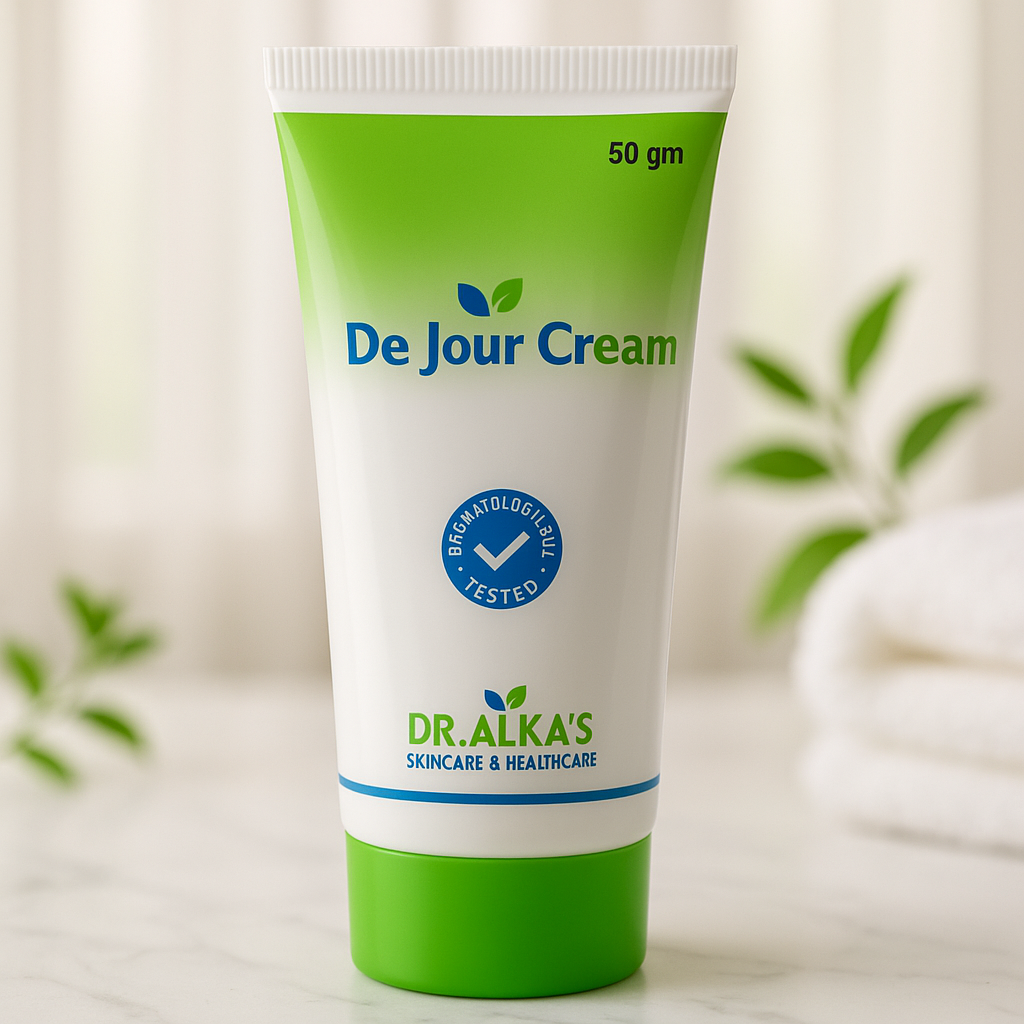
Addressing your mental health is equally important. Therapy, counseling, or simply reaching out to someone you trust can make a huge difference — not only in how you feel, but also in how your skin looks.
A balanced lifestyle also plays a key role. Prioritize sleep, eat a nutrient-rich diet, and stay hydrated. These habits support both your mental clarity and skin renewal process.
If you’re experiencing persistent skin issues, consult a dermatologist. Many cases require a combination of topical treatment and stress management to achieve long-lasting results.

Takeaway: Heal Your Skin by Healing Your Mind
Stress and mental health issues can take a real toll on your skin, and untreated emotional distress can make skin conditions harder to manage. But once you understand this powerful connection, you can begin to take practical steps that support both your emotional health and your complexion.
Because when your mind is calm, your skin often follows.
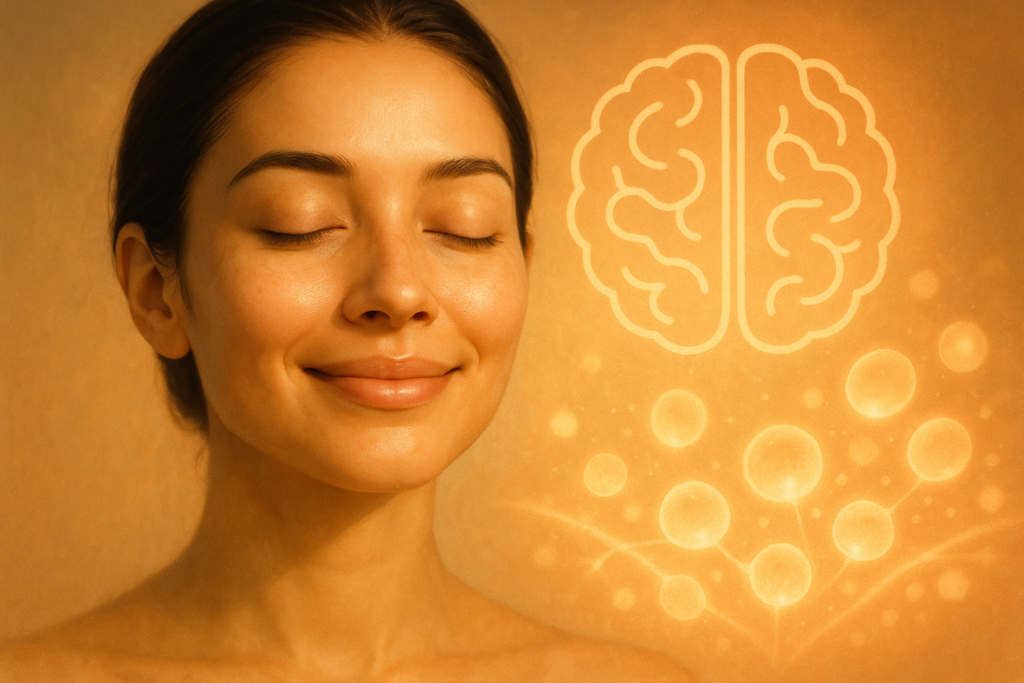
Need Support?
We offer holistic dermatology and stress-related skin consultations.
📞 Call us: +44 777 671 5016
💬 WhatsApp: +44 777 671 5016

